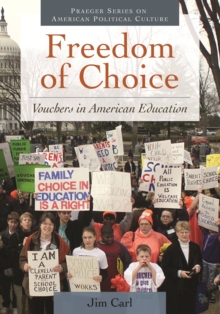
Freedom of Choice : Vouchers in American Education Hardback
by Jim Carl
Part of the Praeger Series on American Political Culture series
Hardback
Description
This book reveals that, far from being the result of a groundswell of support for parental choice in American education, the origins of school vouchers are seated in identity politics, religious schooling, and educational entrepreneurship. Inserting much-needed historical context into the voucher debates, Freedom of Choice: Vouchers in American Education treats school vouchers as a series of social movements set within the context of evolving American conservatism.
The study ranges from the use of tuition grants in the 1950s and early 1960s in the interest of fostering segregation to the wider acceptance of vouchers in the 1990s as a means of counteracting real and perceived shortcomings of urban public schools.
The rise of school vouchers, author Jim Carl suggests, is best explained as a mechanism championed by four distinct groups—white supremacists in the South, supporters of parochial school in the North, minority advocates of community schools in the nation's big cities, and political conservatives of both major parties.
Though freedom was the rallying cry, this book shows that voucher supporters had more specific goals: continued racial segregation of public education, tax support for parochial schools, aid to urban community schools, and opening up the public school sector to educational entrepreneurs.
Information
-
Out of stock
- Format:Hardback
- Pages:292 pages, 11 bw illus
- Publisher:Bloomsbury Publishing Plc
- Publication Date:13/09/2011
- Category:
- ISBN:9780313393273
Information
-
Out of stock
- Format:Hardback
- Pages:292 pages, 11 bw illus
- Publisher:Bloomsbury Publishing Plc
- Publication Date:13/09/2011
- Category:
- ISBN:9780313393273










